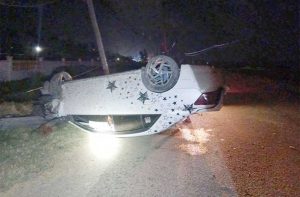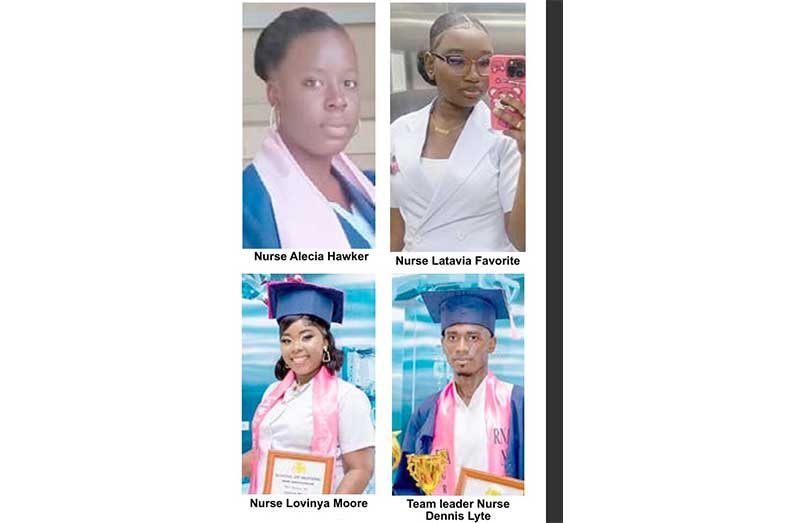– mother credits nurses for saving her son and nephew’s lives
Sometimes, stories from our hospitals make headlines for the wrong reasons, long waiting times, staff shortages, or complaints about service.
But every now and then, a story comes along that reminds us of the compassion, dedication, and quiet heroism that define our healthcare workers.
This is one of those stories. It begins at the Number 75 Public Hospital, where a mother’s words of gratitude touched the hearts of everyone who heard them. Her son and nephew had just survived a terrible accident, and in her own words, “If it wasn’t for the nurses, those boys wouldn’t have made it.”
The accident occurred at Number 41 Village turn. As the car came around the bend, a donkey suddenly ran across the road. In an attempt to avoid hitting the animal, the driver swerved, collided with a lantern post, and the vehicle toppled over, landing turtle-up.
Inside were 20-year-old Karan Mangar and his 17-year-old cousin, one trapped in the front seat, bleeding profusely, and the other unconscious in the back.
Moments after the crash, bystanders gathered at the scene, but no one stepped forward to help the injured boys. Then, by what can only be described as fate, a bus carrying nurses to work been passing by. They saw the overturned car, stopped immediately, and rushed into action. Without hesitation, they pulled the boys from the wreck, placed them in their vehicle, and raced to the hospital, where they continued to fight for the boys’ lives.
“When I arrived at the hospital, all the staff were very cooperative,” the mother of Karan, Indranie Mangar, recalled. “We have no complaints, the nurses, doctors, and even the security guards were all very helpful throughout the entire visit.”
She said the care and compassion at the Number 75 Hospital left a lasting impression.

“I’ve never been to a hospital and received the kind of treatment we did there. Everybody was cooperative and helpful, but I’m especially thankful for the nurses because if it wasn’t for them, the boys probably would be dead. It was a very bad accident.”
She went on to describe how the nurses worked selflessly, covered in blood yet undeterred.
“They didn’t look at their clothes or anything,” she said softly. “When I reached the hospital, the nurses’ uniforms were covered in blood, but they were still working, they did everything to save them.”
With emotion in her voice, she added that she intends to express her gratitude personally once both boys recover.
“I really want to show my appreciation,” she said. “Maybe when the other boy is out of the hospital, we’ll take them out for dinner or lunch or something, because they saved the boys, and I want them to know how much that means to us.”
And while her words reflect the deep gratitude of a mother who nearly lost everything, they also shine a light on the quiet courage of those who stood in the gap between life and death that evening. The nurses whose quick actions and steady hands turned tragedy into survival.
For the team of nurses on that bus, it was instinct, a moment when their training and compassion overpowered fear or hesitation.

“We saw the car upside down and didn’t think twice,” said Raciel Lora Grajales. “We knew the ambulance would take time, so we decided to do something because one of the boys was bleeding badly and the other was unconscious. As nurses, we’re unofficial ambulances every time we’re on the road, morning or night.”
For Sheneze Barkoye, it was her first time responding to an accident scene, but she remembered exactly what to do.
“As healthcare workers, we’re not supposed to pass a scene once there are casualties,” she explained. “It’s in us to help save lives whenever we can. We just separated into teams and handled each patient, hesitation in situations like that can mean death.”
New nurse Izana Tyndall described the experience as “eye-opening,” but said teamwork made all the difference.
“We had great communication, two teams working on both patients at the same time. The best reward for me was hearing ‘thank you, nursery.’ Not every day you get recognized for your good work, and that pushes me to do more.”

Britney McAulay recalled that when they arrived, bystanders were watching but not helping.
“We saw two males trapped in the vehicle in critical condition. No one was assisting, so we took it upon ourselves to get them out and transport them. Nursing teaches you something new every day, it’s one of my dream jobs.”
For Nurse Latavia Favorite, the moment was deeply personal. She was among those who jumped into the car to reach the unconscious patient.
“I took his head in my hands and used my scrub top to stop the bleeding because we had no medical supplies, no gloves, nothing,” she recalled. “We asked for help, but no one responded. My only thought was, ‘we can’t leave them like this.’”
Her colleague, Nurse Alecia Hawker, shared similar feelings of quiet pride afterward.
“It was my first experience like that, but I felt good knowing we were able to help save lives. I love helping people, especially when they’re at their most vulnerable.”
Nurse Lyte, who coordinated much of the response, remembered the chaos vividly.
“People were busy taking videos and photos while we were asking for help to take the boys to the hospital. No one wanted to get involved,” he said. “My compassion and sense of humanity pushed me to act, I knew that offering help could make a difference, and I couldn’t ignore someone in need.”

And for Nurse Lovinya Moore, the experience only deepened her sense of purpose.
“People told me not to go into nursing because it was hard and dirty work,” she said. “But hearing someone say ‘thank you, nursey, God will bless you,’ that makes every challenge worth it.”
What began as a tragic road accident became a story of courage and compassion. But for these nurses, it was also a reminder of why they chose this calling, the difference a single act of care can make.
Their stories extend beyond that one night. Behind every uniform are men and women balancing long shifts, studies, families, and personal challenges, yet showing up, day after day, because they believe in service.
Their actions that evening didn’t just save lives, they restored faith in humanity, in the power of empathy, and in the quiet strength of those who care for us when we’re most in need.
At Number 75 Hospital, heroism didn’t wear a cape that night. It wore a nurse’s uniform, stained with blood, but shining with compassion. (Credit: Romella Dasratt, Office of the Director General, Ministry of Health)




.jpg)









